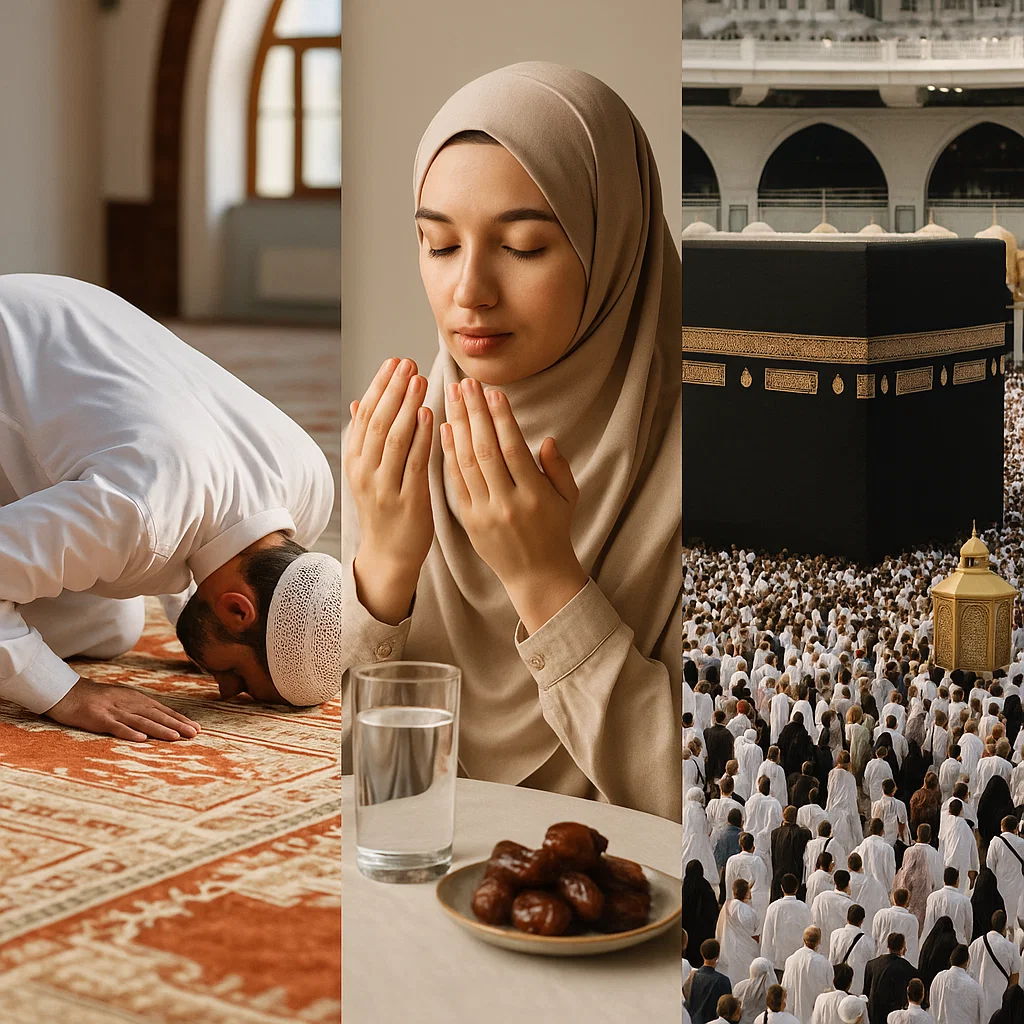What is the meaning of Namaz, Roza, and Hajj?
Islam is not limited to rituals or worship alone; it is a complete way of life that guides a person towards discipline, self-purification, and brotherhood. Among the Five Pillars of Islam, three stand out for their spiritual depth and global significance: Namaz (Salah), Roza (Fasting), and Hajj (Pilgrimage). These acts are not only religious obligations but also symbols of inner peace, moral development, and social unity.
1. The Importance of Namaz (Salah)
Namaz is the second pillar of Islam. Every Muslim is required to perform it five times a day – Fajr, Zuhr, Asr, Maghrib, and Isha.
Direct connection with Allah: Namaz is the most powerful means of communication between a servant and Allah. Through it, a believer seeks forgiveness and mercy.
Discipline and punctuality: Praying at fixed times makes a person organized and responsible.
Spiritual peace: Bowing down in prostration removes arrogance and fills the heart with peace.
Equality in worship: In a mosque, rich and poor, rulers and commoners, all stand shoulder to shoulder in prayer, reflecting equality and unity.
The Quran says:
“Indeed, prayer restrains from indecency and wrongdoing.” (Surah Al-Ankabut 29:45)
2. The Importance of Roza (Fasting)
Roza is the fourth pillar of Islam, observed during the holy month of Ramadan. From dawn to sunset, Muslims abstain from food, drink, and sinful behavior.
Self-control: Fasting teaches discipline and control over desires.
Empathy for the poor: Experiencing hunger makes one more compassionate toward those who suffer from poverty.
Spiritual purification: Roza is not only about avoiding food and drink but also about refraining from lies, anger, and harmful actions.
Health benefits: Fasting detoxifies the body and improves overall health.
The Prophet Muhammad (peace be upon him) said:
“Fasting is a shield; it protects a person from sin.” (Sahih Bukhari, Muslim)
3. The Importance of Hajj (Pilgrimage)
Hajj is the fifth pillar of Islam. Every Muslim who is physically and financially capable must perform it at least once in a lifetime. It takes place in the holy city of Makkah, Saudi Arabia.
Global brotherhood: Millions of Muslims from across the world gather during Hajj. By wearing the same simple clothing (Ihram), all distinctions of wealth, race, and status disappear.
Sacrifice and devotion: Hajj commemorates the sacrifice of Prophet Ibrahim (Abraham, peace be upon him) and his family. It reminds believers to surrender their desires and wealth in the way of Allah.
Strengthening of faith: The rituals of Hajj – the Tawaf (circumambulation of the Kaaba), standing at Arafat, walking between Safa and Marwah, and offering sacrifice – deepen faith and connection with Allah.
Equality and unity: Hajj sends a strong message that in the sight of Allah, all human beings are equal.
The Quran states:
“Pilgrimage to the House is a duty owed to Allah by all who can afford the journey.” (Surah Aal-e-Imran 3:97)
Namaz, Roza, and Hajj are not just outward rituals but powerful spiritual practices that shape a believer’s character and outlook on life.
Namaz brings spiritual peace and equality.
Roza develops self-control and compassion.
Hajj strengthens global brotherhood and the spirit of sacrifice.
Together, they nurture discipline, humility, and humanity. Their ultimate purpose is not only to fulfill religious duties but also to transform individuals into better, kinder, and more compassionate human beings. This is the essence of Islam – peace, love, and brotherhood.
~Religion World Bureau










